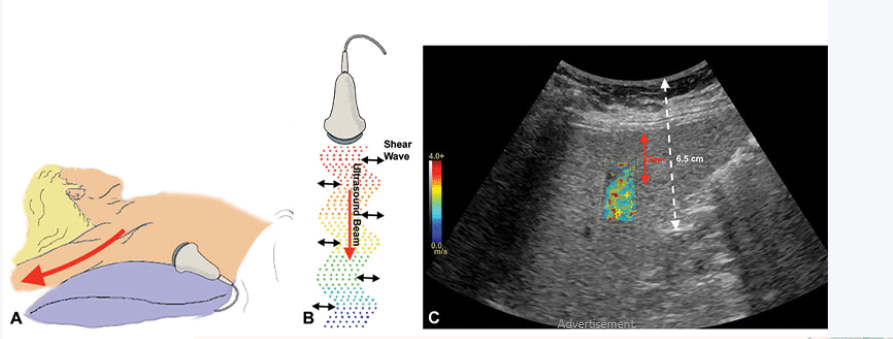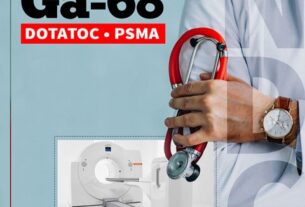Overview
What is a USG FibroScan of Liver?
A USG FibroScan of the Liver (also called Liver Elastography) is a specialized ultrasound test that measures how stiff or elastic your liver is.
It helps doctors check for liver fibrosis (scarring) and fatty liver disease — conditions that can develop due to hepatitis, alcohol use, or other liver problems.
Unlike a liver biopsy, a FibroScan is completely non-invasive, quick, and painless. It uses gentle sound waves and vibrations to assess the liver’s condition and gives results within minutes.
In short, a USG FibroScan helps evaluate your liver’s health — how much fat and scarring are present — so your doctor can plan the right treatment and monitor your liver over time.
What does a USG FIBROSCAN OF LIVER diagnose?
A USG FibroScan of the Liver is a quick, painless test that helps your doctor check the health of your liver.
It can detect:
- Fatty liver – when extra fat builds up in your liver.
- Liver scarring (fibrosis) – early signs of liver damage.
- Cirrhosis – advanced liver scarring that can affect liver function.
- Damage from hepatitis or alcohol – long-term infections or alcohol use can harm the liver.
Basically, it tells your doctor how healthy your liver is, how much fat or scarring is present, and whether treatment or lifestyle changes are needed.
Indications
A USG FibroScan is recommended when there is a need to assess liver health, especially for detecting fibrosis, cirrhosis, or fatty liver.
Common indications include:
- Chronic Liver Disease:
- Chronic hepatitis B or C
- Alcohol-related liver disease
- Fatty Liver Disease (NAFLD/NASH):
- Suspected due to obesity, diabetes, or high cholesterol
- Abnormal Liver Function Tests:
- Elevated liver enzymes (ALT, AST) without a clear cause
- Monitoring Known Liver Disease:
- Tracking progression or regression of fibrosis or fatty liver
- Before or During Treatment:
- To assess response to antiviral or lifestyle therapy
- Suspected Cirrhosis:
- To detect early scarring before complications appear
- Risk Factors for Liver Disease:
- Diabetes, metabolic syndrome, obesity, long-term alcohol use, or family history of liver disease
Test Details
who performs a USG Fibro Scan of Liver ?
A USG Fibro Scan is usually performed by a trained sonographer, radiologist, or hepatologist who has experience in liver elastography.
- Sonographer/Technician: Operates the Fibro Scan machine and takes the measurements.
- Radiologist or Hepatologist: Interprets the results and explains them to the patient.
What types of scanners are used for USG FibroScan of Liver?
Types of Scanners Used for USG FibroScan of Liver
A USG FibroScan uses special ultrasound-based elastography machines to measure liver stiffness and fat. There are a few types of scanners commonly used:
1.FibroScan® (Vibration-Controlled Transient Elastography – VCTE):
- The most widely used and standard machine.
- Measures liver stiffness and controlled attenuation parameter (CAP) to assess fat content.
2.Ultrasound Elastography Machines:
- Integrated into some conventional ultrasound systems.
- Can perform Shear Wave Elastography (SWE) or Point Shear Wave Elastography (pSWE).
- Provides both imaging and stiffness measurement.
3.Portable FibroScan Devices:
- Handheld versions for clinics or smaller centers.
- Useful for screening or follow-up.
What happens before a USG FibroScan of Liver?
Before a USG FibroScan of Liver To ensure accurate results, here’s what usually happens before the test:
- Fasting:
Avoid eating or drinking for about 2–3 hours before the scan.
This helps reduce interference from food in the stomach.
- Clothing:
Wear loose, comfortable clothes so the technician can easily access your abdomen.
- Medication:
Most medications can be continued as usual.
Inform your doctor if you take any liver-related medicines.
- Medical History
Your doctor may ask about liver disease, alcohol use, or hepatitis.
- Relaxation:
Try to stay calm — the test is painless and non-invasive.
What happens during a USG FibroScan of Liver?
Here’s what you can expect during the test:
- Positioning:
- You’ll lie comfortably on your back with your right arm raised above your head to expose the liver area.
- Applying Gel:
- A small amount of ultrasound gel is applied to your skin over the right upper abdomen to help the probe make good contact.
- Using the Probe:
- The technician places a FibroScan probe (similar to an ultrasound probe) on your skin.
- The probe sends painless vibrations and sound waves into the liver.
- Measurements:
- The machine measures how fast the waves travel through your liver tissue.
- This helps calculate liver stiffness (to check for fibrosis) and fat content.
- Duration:
- The whole procedure takes about 10–15 minutes.
How long does a USG FibroScan of Liver take?
A USG FibroScan of the Liver is a quick and simple procedure.
The scan itself usually takes about 10 to 15 minutes.
Including preparation time, the whole visit may take around 20 to 30 minutes.
What Happens After a USG FibroScan of Liver?
After the test, you can return to your normal routine right away — there’s no recovery time needed.
Here’s what typically happens next:
Immediate Results:
- The machine provides instant readings of your liver stiffness and fat content.
- These results are recorded and sent to your doctor.
Doctor’s Interpretation:
- Your doctor will review the results to check for signs of fatty liver, fibrosis, or cirrhosis.
- They’ll explain what the numbers mean and whether any treatment or lifestyle changes are needed.
No Side Effects:
- The procedure is safe, painless, and radiation-free.
- You can eat, drink, and go about your day as usual.
What are the benefits of a USG FibroScan of Liver?
A FibroScan offers numerous benefits over traditional liver assessments, primarily due to its non-invasive nature. It is a safe, painless, and highly efficient way to diagnose and monitor chronic liver conditions.
Key benefits
- Non-invasive and low-risk: Unlike a liver biopsy, a FibroScan does not involve needles, surgical incisions, or anesthesia, eliminating risks like pain, bleeding, and infection. This makes it a much safer and more comfortable option for patients.
- Quick and convenient: The entire procedure is quick, typically taking only 5 to 15 minutes, with immediate results. Because there is no recovery time, you can return to your normal routine right away.
- Accurate and quantitative: It provides a reliable, numerical measurement of liver stiffness (fibrosis) and fat content (steatosis), which helps doctors assess the severity of conditions like non-alcoholic fatty liver disease (NAFLD), hepatitis, and cirrhosis.
- Excellent for monitoring: Since it is non-invasive and repeatable, a FibroScan is an ideal tool for monitoring the progression of liver disease over time. This allows doctors to track the effectiveness of treatment plans and make timely adjustments.
- Cost-effective: Compared to a liver biopsy, the procedure is significantly less expensive, reducing overall healthcare costs for both patients and the system.
- Early detection: A FibroScan can detect early signs of liver damage before symptoms appear or traditional lab tests show abnormalities. Early diagnosis is crucial for starting treatment and making lifestyle changes to prevent further damage.
- Wider applicability: Because of its safety and minimal discomfort, it is a suitable diagnostic tool for a broader range of patients, including those who may not be good candidates for an invasive biopsy due to other health conditions.
What are the risks of a USG FibroScan of Liver?
A USG FibroScan of the liver is considered a very safe and low-risk procedure. It uses ultrasound-based technology (not radiation or needles) to assess liver stiffness. However, like any medical test, there are a few minor considerations to keep in mind.
- Minimal to no side effects
- The test is non-invasive, painless, and does not involve radiation.
- Most patients experience no discomfort during or after the procedure.
- Mild discomfort in rare cases
- Some people may feel a slight tapping or vibration on the skin during the scan.
- This sensation is brief and harmless.
- Limited accuracy in certain conditions
- Results may be less accurate in:
- People who are very overweight (obese)
- Those with ascites (fluid in the abdomen)
- When there is severe inflammation or cholestasis
In such cases, your doctor might recommend other imaging or tests for confirmation.
- Not suitable for some patients
- Fibro Scan may not be performed on:
- Pregnant women, due to limited safety data (though no known harm)
- Patients with implanted devices (like pacemakers), unless cleared by their doctor
- Possible need for follow-up
- An abnormal or unclear result may require additional tests, such as a liver biopsy or MRI elastography, to confirm findings.
A note from North City Diagnostic
The uncertainty of not knowing what’s happening with your liver can make you uneasy. A USG FibroScan of the Liver can provide clarity. This quick, non-invasive ultrasound-based test helps your healthcare provider assess liver stiffness and fat content, aiding in the detection of conditions such as fatty liver, hepatitis, and liver fibrosis. Different types of FibroScan devices are available, depending on your needs and body type. Your provider will review your results and discuss the next steps based on your liver health findings.
Care at North City Diagnostic
If you have concerns about your liver health or suffer from conditions such as fatty liver, hepatitis, or cirrhosis, you need a team of experts you can trust.
Our physicians and gastroenterologists at North City Diagnostic are here to help with advanced liver assessment tools like USG FibroScan, personalized guidance, and comprehensive care to keep your liver healthy.





